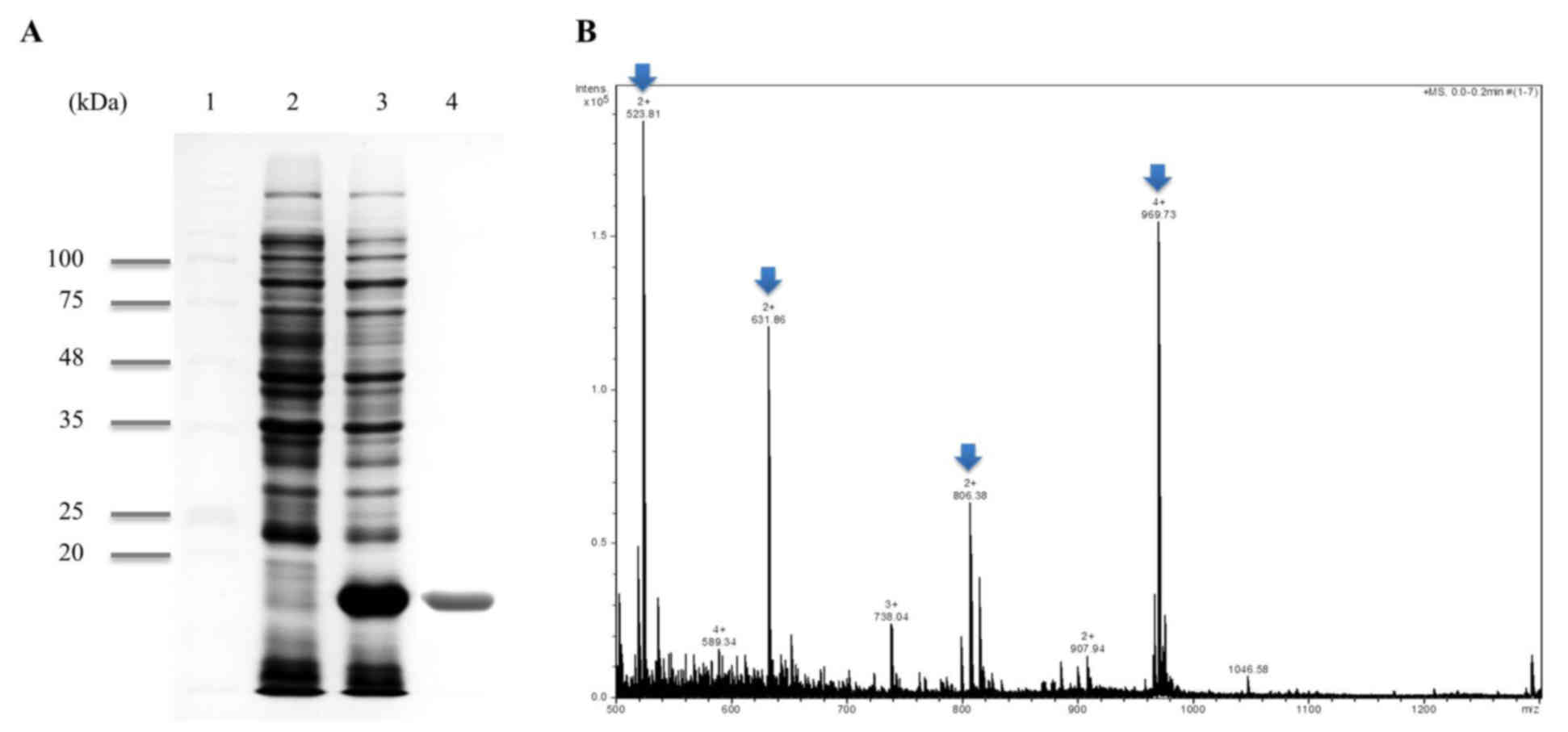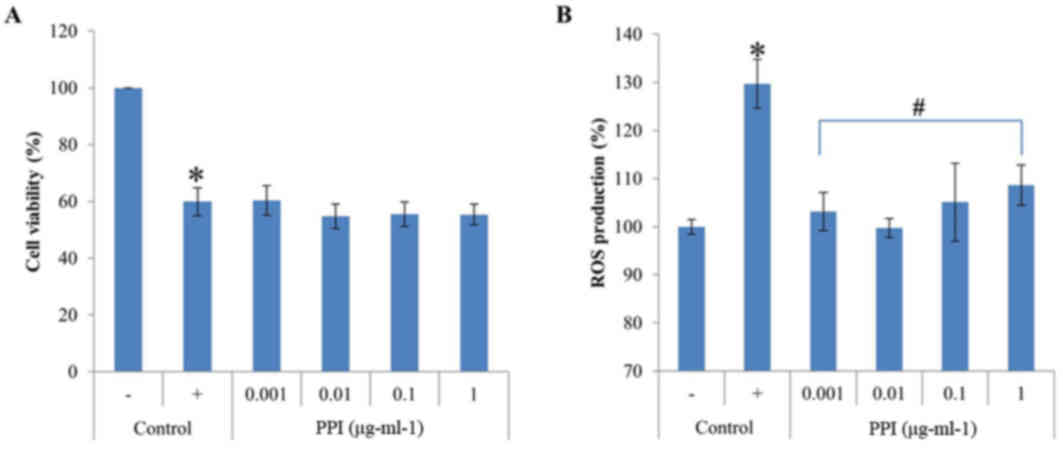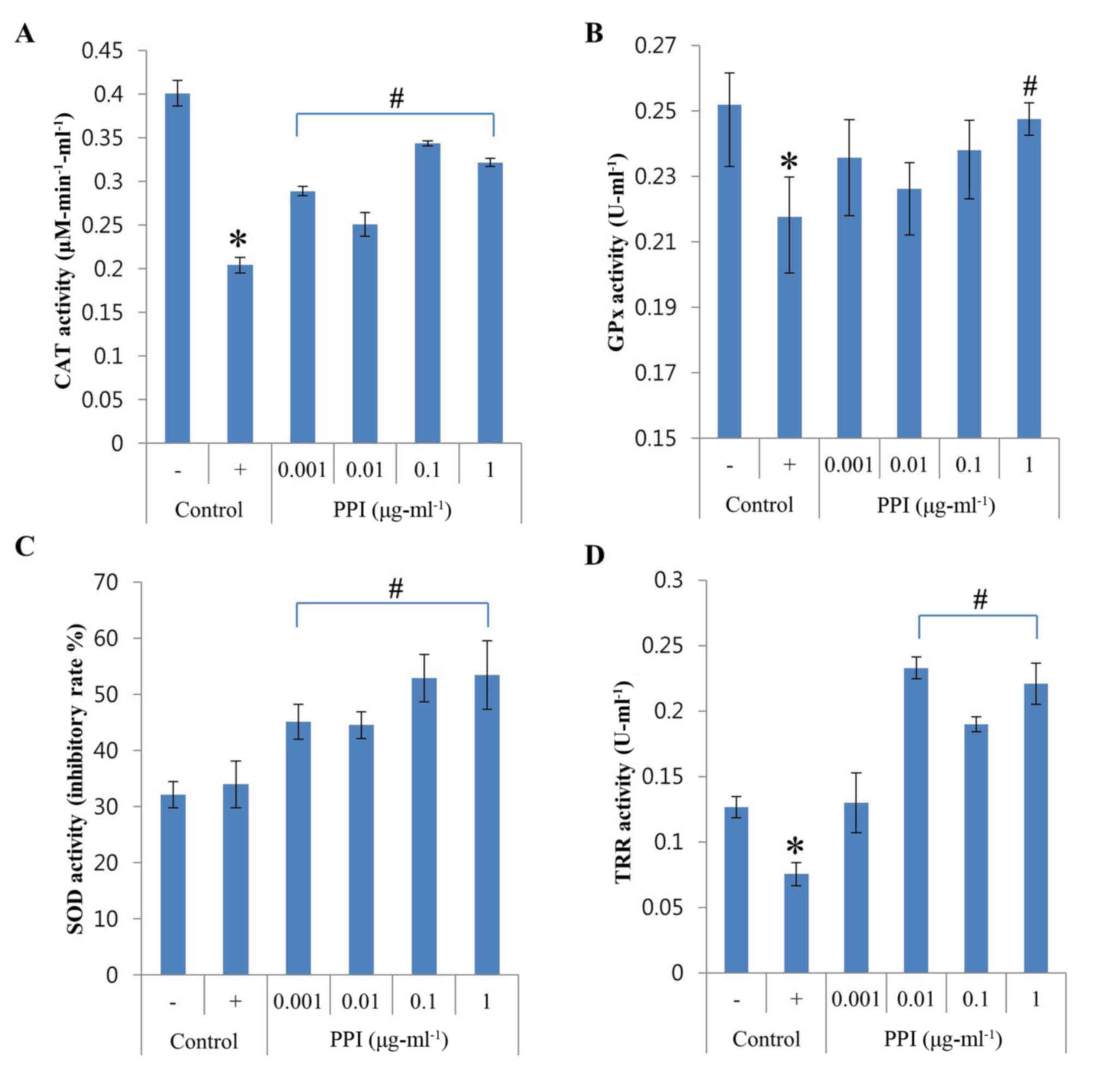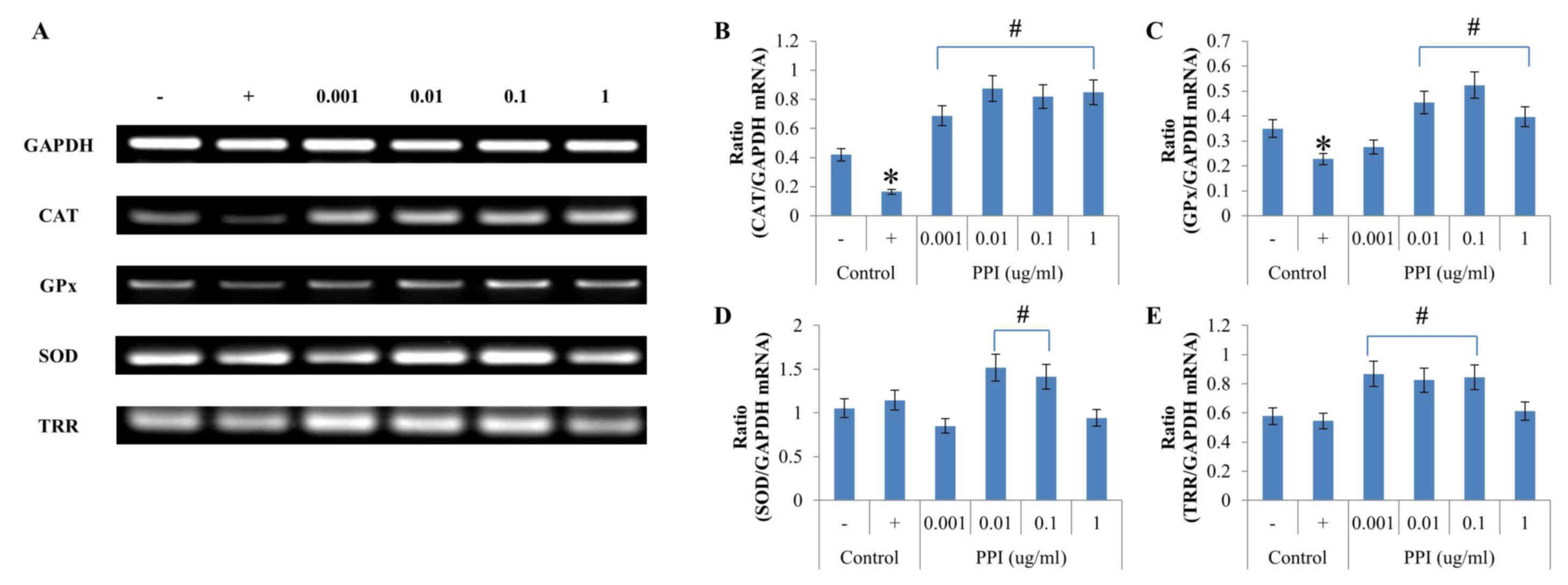|
1
|
Harman D: Role of free radicals in aging
and disease. Ann N Y Acad Sci. 673:126–141. 1992. View Article : Google Scholar
|
|
2
|
Bhattacharyya A, Chattopadhyay R, Mitra S
and Crowe SE: Oxidative stress: An essential factor in the
pathogenesis of gastrointestinal mucosal diseases. Physiol Rev.
94:329–354. 2014. View Article : Google Scholar :
|
|
3
|
Bentley AR, Emrani P and Cassano PA:
Genetic variation and gene expression in antioxidant related
enzymes and risk of COPD: A systematic review. Thorax. 63:956–961.
2008. View Article : Google Scholar :
|
|
4
|
Lobo V, Patil A, Phatak A and Chandra N:
Free radicals, antioxidants and functional foods: Impact on human
health. Pharmacogn Rev. 4:118–126. 2010. View Article : Google Scholar :
|
|
5
|
Young IS and Woodside JV: Antioxidants in
health and disease. J Clin Pathol. 54:176–186. 2001. View Article : Google Scholar :
|
|
6
|
Apel K and Hirt H: Reactive oxygen
species: Metabolism, oxidative stress, and signal transduction.
Annu Rev Plant Biol. 55:373–399. 2004. View Article : Google Scholar
|
|
7
|
Zelko IN, Mariani TJ and Folz RJ:
Superoxide dismutase multigene family: A comparison of the CuZn-SOD
(SOD1), Mn-SOD (SOD2), and EC-SOD (SOD3) gene structures,
evolution, and expression. Free Radic Biol Med. 33:337–349. 2002.
View Article : Google Scholar
|
|
8
|
Flora SJ: Structural, chemical and
biological aspects of antioxidants for strategies against metal and
metalloid exposure. Oxid Med Cell Longev. 2:191–206. 2009.
View Article : Google Scholar :
|
|
9
|
de M, Bandeira S, da Fonseca LJ, da S
Guedes G, Rabelo LA, Goulart MO and Vasconcelos SM: Oxidative
stress as an underlying contributor in the development of chronic
complications in diabetes mellitus. Int J Mol Sci. 14:3265–3284.
2013. View Article : Google Scholar :
|
|
10
|
Takahashi N, Hayano T and Suzuki M:
Peptidyl-prolyl cis-trans isomerase is the cyclosporin A-binding
protein cyclophilin. Nature. 337:473–475. 1989. View Article : Google Scholar
|
|
11
|
Pérez de Lema G, Arribas-Gómez I,
Ruiz-Ginés JA, de Arriba G, Prieto A, Rodriguez-Puyol D and
Rodriguez-Puyol M: Reactive oxygen species mediate the effects of
cyclosporine A on human cultured mesangial cells. Transplant Proc.
29:1241–1243. 1997. View Article : Google Scholar
|
|
12
|
McGrath LT, Treacy R, McClean E and Brown
JH: Oxidative stress in cyclosporin and azathioprine treated renal
transplant patients. Clin Chim Acta. 264:1–12. 1997. View Article : Google Scholar
|
|
13
|
Zhong Z, Arteel GE, Connor HD, Yin M,
Frankenberg MV, Stachlewitz RF, Raleigh JA, Mason RP and Thurman
RG: Cyclosporin A increases hypoxia and free radical production in
rat kidneys: Prevention by dietary glycine. Am J Physiol.
275:F595–F604. 1998.
|
|
14
|
Brazin KN, Mallis RJ, Fulton DB and
Andreotti AH: Regulation of the tyrosine kinase Itk by the
peptidyl-prolyl isomerase cyclophilin A. Proc Natl Acad Sci USA.
99:pp. 1899–1904. 2002; View Article : Google Scholar :
|
|
15
|
Ferreira PA, Nakayama TA, Pak WL and
Travis GH: Cyclophilin-related protein RanBP2 acts as chaperone for
red/green opsin. Nature. 383:637–640. 1996. View Article : Google Scholar
|
|
16
|
Galat A: Variations of sequences and amino
acid compositions of proteins that sustain their biological
functions: An analysis of the cyclophilin family of proteins. Arch
Biochem Biophys. 371:149–162. 1999. View Article : Google Scholar
|
|
17
|
Horowitz DS, Lee EJ, Mabon SA and Misteli
T: A cyclophilin functions in pre-mRNA splicing. EMBO J.
21:470–480. 2002. View Article : Google Scholar :
|
|
18
|
Krzywicka A, Beisson J, Keller AM, Cohen
J, Jerka-Dziadosz M and Klotz C: KIN241: A gene involved in cell
morphogenesis in Paramecium tetraurelia reveals a novel protein
family of cyclophilin-RNA interacting proteins (CRIPs) conserved
from fission yeast to man. Mol Microbiol. 42:257–267. 2001.
View Article : Google Scholar
|
|
19
|
Leverson JD and Ness SA: Point mutations
in v-Myb disrupt a cyclophilin-catalyzed negative regulatory
mechanism. Mol Cell. 1:203–211. 1998. View Article : Google Scholar
|
|
20
|
Lin DT and Lechleiter JD: Mitochondrial
targeted cyclophilin D protects cells from cell death by peptidyl
prolyl isomerization. J Biol Chem. 277:31134–31141. 2002.
View Article : Google Scholar
|
|
21
|
O'Connell S, Tuite N, Slattery C, Ryan MP
and McMorrow T: Cyclosporine A-induced oxidative stress in human
renal mesangial cells: A role for ERK 1/2 MAPK signaling. Toxicol
Sci. 126:101–113. 2012. View Article : Google Scholar
|
|
22
|
de Oliveira e Silva AM, Vidal-Novoa A,
Batista-González AE, Pinto JR, Mancini DA Portari, Reina-Urquijo W
and Mancini-Filho J: In vivo and in vitro antioxidant activity and
hepatoprotective properties of polyphenols from Halimeda opuntia
(Linnaeus) Lamouroux. Redox Rep. 17:47–53. 2012. View Article : Google Scholar
|
|
23
|
Ismail A Jr and Tan S: Antioxidant
activity of selected commercial seaweeds. Malays J Nutr. 8:167–177.
2002.
|
|
24
|
Chandini SK, Ganesan P and Bhaskar N: In
vitro antioxidant activities of three selected brown seaweeds of
India. Food Chem. 107:707–713. 2008. View Article : Google Scholar
|
|
25
|
Kumar SR, Hosokawa M and Miyashita K:
Fucoxanthin: A marine carotenoid exerting anti-cancer effects by
affecting multiple mechanisms. Mar Drugs. 11:5130–5147. 2013.
View Article : Google Scholar :
|
|
26
|
Sathya R, Kanaga N, Sankar P and Jeeva S:
Antioxidant properties of phlorotannins from brown seaweed
Cystoseira trinodis (Forsskål) C. Agardh. Arab J Chem. 2013.
View Article : Google Scholar
|
|
27
|
Yuan YV, Bone DE and Carrington MF:
Antioxidant activity of dulse (Palmaria palmata) extract evaluated
in vitro. Food Chem. 91:485–494. 2005. View Article : Google Scholar
|
|
28
|
Balboa EM, Conde E, Moure A, Falqué E and
Domínguez H: In vitro antioxidant properties of crude extracts and
compounds from brown algae. Food Chem. 138:1764–1785. 2013.
View Article : Google Scholar
|
|
29
|
Ganesan P, Kumar CS and Bhaskar N:
Antioxidant properties of methanol extract and its solvent
fractions obtained from selected Indian red seaweeds. Bioresour
Technol. 99:2717–2723. 2008. View Article : Google Scholar
|
|
30
|
Hwang ES and Thi ND: Effects of extraction
and processing methods on antioxidant compound contents and radical
scavenging activities of laver (Porphyra tenera). Prev Nutr Food
Sci. 19:40–48. 2014. View Article : Google Scholar :
|
|
31
|
Fathi-Roudsari M, Akhavian-Tehrani A and
Maghsoudi N: Comparison of three Escherichia coli strains in
recombinant production of reteplase. Avicenna J Med Biotechnol.
8:16–22. 2016.
|
|
32
|
Abu-Reidah IM, Arráez-Román D,
Quirantes-Piné R, Fernández-Arroyo S, Segura-Carretero A and
Fernández-Gutiérrez A: HPLC-ESI-Q-TOF-MS for a comprehensive
characterization of bioactive phenolic compounds in cucumber whole
fruit extract. Food Res Int. 46:108–117. 2012. View Article : Google Scholar
|
|
33
|
Schmidt AJ, Heiser P, Hemmeter UM, Krieg
JC and Vedder H: Effect of antidepressants on mRNA levels of
antioxidant enzymes in human monocytic U-937 cells. Prog
Neuro-Psychoph. 32:1567–1573. 2008. View Article : Google Scholar
|
|
34
|
Aguilar-Melero P, Prieto-Álamo MJ, Jurado
J, Holmgren A and Pueyo C: Proteomics in HepG2 hepatocarcinoma
cells with stably silenced expression of PRDX1. J Proteomics.
79:161–171. 2013. View Article : Google Scholar
|
|
35
|
Dinkova-Kostova AT and Talalay P: Direct
and indirect antioxidant properties of inducers of cytoprotective
proteins. Mol Nutr Food Res. 52 Suppl 1:S128–S138. 2008.
|
|
36
|
Liao JC, Chiu CS, Chen HJ, Huang SS, Hou
WC, Lin WC, Lin YH and Huang GJ: Characterization of a novel
Cyclophilin-type peptidylprolyl isomerase protein from sweet potato
storage roots. Botanical Studies. 53:315–324. 2012.
|
|
37
|
Lee SP, Hwang YS, Kim YJ, Kwon KS, Kim HJ,
Kim K and Chae HZ: Cyclophilin A binds to peroxiredoxins and
activates its peroxidase activity. J Biol Chem. 276:29826–29832.
2001. View Article : Google Scholar
|
|
38
|
Glanemann C, Loos A, Gorret N, Willis LB,
O'Brien XM, Lessard PA and Sinskey AJ: Disparity between changes in
mRNA abundance and enzyme activity in Corynebacterium glutamicum:
Implications for DNA microarray analysis. Appl Microbiol
Biotechnol. 61:61–68. 2003. View Article : Google Scholar
|


















